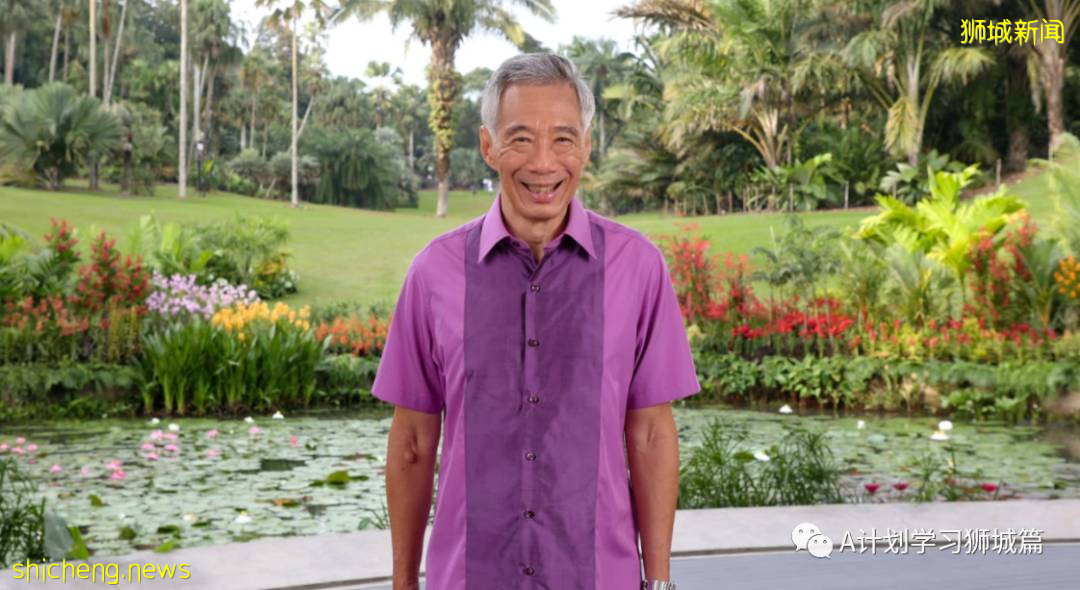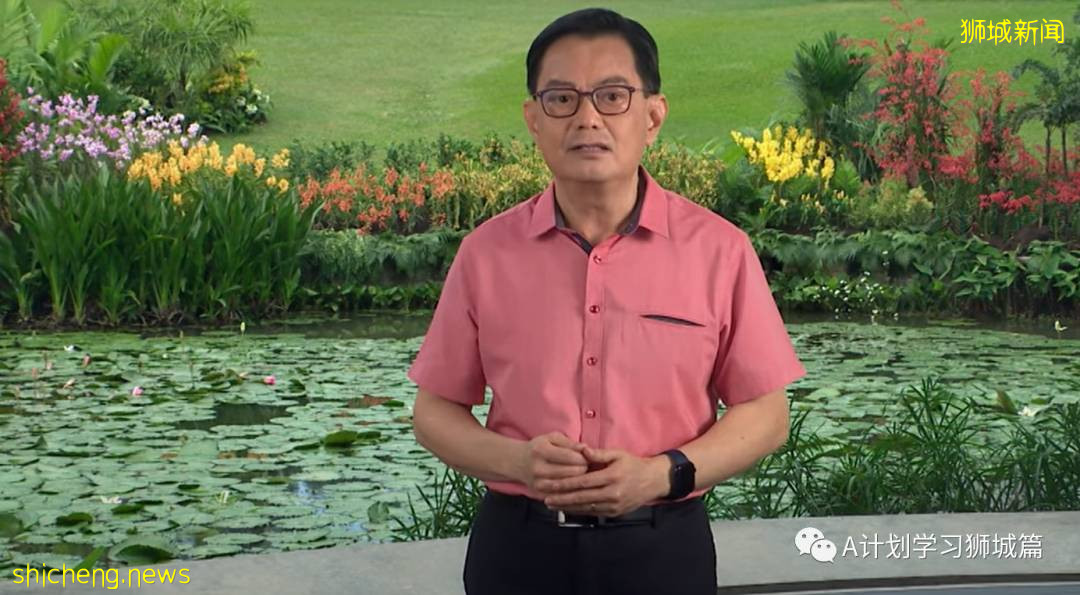新加坡國慶節
李顯龍總理國慶獻詞
2021年8月8日
李顯龍2021年國慶獻詞,華語版由副總理兼經濟政策統籌部長王瑞傑宣讀,以下是全文:
華語獻詞全文
各位同胞:
我現在就在植物園的交響樂湖。這是許多人喜愛的景點。我國正處于高警戒期間,所以這裏不如以往那麽熱鬧。即便如此,它仍是個受歡迎的休閑場所。
2019冠狀病毒疾病
我們在對抗冠病的過程中,經曆了不少波折。它是個很難對付的敵人。它不但在全球奪走了數百萬條人命,還導致幾億人患病,波及無數的工作和企業。在新加坡,每當我們認爲疫情已經受到控制時,新一波疫情又突然暴發。
最近,裕廊漁港出現大型感染群。病毒已經從漁港擴散到全島許多濕巴刹,導致還未接種疫苗的年長者面對患病的風險。我們不得不收緊防疫措施,以減緩病毒傳播的速度,保護我們的年長人士。這樣,我們也能爭取時間,讓更多人完成疫苗接種。
許多人對于疫情的反彈感到失望、受挫。尤其是我國的情況先前已經取得良好進展。可是,我們始終以保護生命和保住生計爲目標。要取得平衡的確不容易。不過,一系列的防疫措施、自律的民衆,以及政府推出的多個纾困配套,再加上醫護人員的付出和大家的支援,讓我們能夠應付各項挑戰。我國在防疫方面肯定有可改進的地方,但總的來說,我們成功保障了民衆和客工的安全。冠病的死亡率也很低。
如今,每一天接種疫苗的人數,相當于我國人口的百分之一。超過三分之二的居民已經完成接種;百分之八十五的年長人士則已經接種了至少一劑疫苗。更多人有了疫苗的保護,我們在對抗病毒方面就更加強韌。接下來,我們會按部就班,謹慎地開放經濟,向新常態邁進。
與此同時,在這場抗疫大戰中,大家都難免受到影響。我們現在更需要關心家人和朋友,看一看他們是否感到疲憊、憂慮,或者痛苦,需要援助。當我們自己遇到困難時,也一定要勇于尋求幫助。國人在面對這場危機中,通力合作、守望相助。雖然我們依舊緊密團結,但這不是理所當然的。冠病疫情給我國社會帶來不少壓力,也引發了一些需要我們解決的難題。
讓我說明其中的三個問題。
低薪工友
首先,我們必須幫助低薪工友。他們在這場疫情中受到了最大的沖擊。和所有國人一樣,低薪工友與他們的家人享有負擔得起的和良好的醫療服務、住房選擇和教育機會。可是,他們的儲蓄不多,這期間,有的工友收入還減少了,一些則不幸失去工作,處境就更加艱難了。因此,政府給予他們更多的幫助,以渡過這場危機。
長遠來看,我國經濟對技能的需求將日益增加,低薪工友需要我們不斷地給予更多支持。由勞資政三方組成的工作小組不斷制定一系列措施,來改善工友的生活和就業前景。這些措施會在就業獎勵計劃和漸進式薪金模式的基礎上發揮作用,幫助他們提高收入,並爲提升技能和職業發展帶來新的機會。
讓低薪工友的生活有實質提升是包容性經濟增長的重要部分。在新加坡,無論您人生的起跑點在哪裏,我們要確保您和您的孩子都有機會力爭上遊,改善生活。
外籍人士
第二, 外籍員工所帶來的競爭,讓一些國人感到焦慮。我們必須解決這個問題。外籍員工有助于促進新加坡的經濟發展,爲我國帶來更多的機遇。引進世界各地的外來人才與技能,同本地的勞動隊伍相輔相成,將促使更多企業在本地投資,進而爲國人創造更多工作。這是一個良性循環。新加坡人都明白,爲了我們的經濟需要,我們必須接納各地的人才與技能。
但是,當外籍員工的人數衆多,人們難免會擔憂找工作時面對競爭。冠病疫情造成的不確定性加深了國人這方面的憂慮。外籍員工和本地員工相得益彰,但也可能互相競爭。本地員工有時會覺得自己受到不公平的待遇,比如當他們失去受聘或升職機會時,就會有這種感覺。在職場外,一些外籍員工和他們的家人由于還沒有完全習慣新加坡的社會規範,以及完全融入本地社會,偶爾就會跟國人發生摩擦。
我理解國人的擔憂和這方面的問題,我們會調整政策,以更好地管理外籍員工的素質和人數,避免他們過度集中在某一些領域。如果我們處理好這些問題,我們能夠繼續引進外籍員工和新移民。這是必要的。排外會有損我國的根本利益,破壞我國作爲國際和區域樞紐的聲譽,最終也將導致我們失去工作和許多機遇。更重要的是,這同我們保持開放,接納各種差異的價值觀背道而馳。這些是我們維護的價值觀,讓新加坡不斷取得繁榮進步。
種族與宗教
第三,我們必須謹慎處理種族和宗教課題。新加坡是個多元種族的和諧社會,在世界上獨一無二,讓我們感到自豪。然而,維護種族和諧是一項持續不斷的工作。我們的社會規範會隨著每一代人的不同經曆和期望不斷演變。而我國是個開放的國際化都市,與世界各地有聯系,這些規範會受到外來思潮的沖擊。因此,每一代國人都必須致力于促進種族和諧,重申它的重要性,還要更新種族之間的關系。
最近,一些涉及種族歧視的事件被社交媒體放大後,引起衆人關注。這些事件雖然令人擔憂,但不代表這些行爲已經很普遍。其實,在日常生活中,各族之間也有許多愉快的互動,但這些好人好事卻很少引起關注。這些負面事件不代表我們促進種族和諧的方式不管用。可是,這些事件體現了種族和宗教課題總是會引起情緒化的反應,很容易使我國社會分化。所以,政府必須不斷密切關注這些課題。
討論並正視這些敏感課題有利于社會的發展。討論時我們應該互相尊重、坦誠相對。經過幾代國人的不懈努力,我們今天才能夠看到各種族、各宗教和睦共處,並且享有日益擴大的共同空間。這份和諧,有賴于我國各族群之間,不管是多數還是少數族群,大家互相理解、包容和妥協,以大局爲重,而不是堅持維護自己的身份與權利。
這是個微妙的平衡,來得不易,我們必須小心經營,加以珍惜。我們要隨著社會的演變不斷調整,才能維持各族群之間的和諧。政府有義務代所有新加坡人,不分種族、言語或宗教,處理好這些課題。而我們需要全體國人的配合、支持和信任。
總結
這些社會問題並非我國獨有。其他國家正面臨更嚴重的分化。這些問題對我們來說也不陌生。早在1959年,當新加坡成爲自治邦時,不同族群在不同社區各自生活,到不同語文源流的學校上課,在不同的工作崗位和行業打拼。因此,新組成的人民行動黨政府就在新加坡各地舉辦了一系列多元文化綜藝節目,以幫助人民能更好地理解彼此的文化和習俗。這些活動就是人民綜藝節目,也稱Aneka Ragam Rakyat。當年,李顯龍總理和他的父母到植物園來,觀賞在這裏舉辦的第一場人民綜藝節目。這些節目是我們塑造國民意識的開始。
這些年來,我們經曆風雨、克服萬難,才有今天的新加坡。接下來在前進的道路上,有時會出現新的危機,再一次考驗我們的團結和毅力。我們在應對冠病危機時,展現了堅強剛毅、齊心協力的精神。就如今年的國慶主題曲寫道:“我們曾經做到,也必將再次成功!”我有信心新加坡能不斷建設更和諧的社會、更繁榮的經濟、更成功的國家,讓子孫後代安居樂業,讓我國長治久安。
祝大家國慶日快樂!
英文獻詞全文
My fellow Singaporeans,
I am standing here at the Symphony Lake in the Botanic Gardens. This is a favourite spot for many of us. It is not quite as busy now because of the Heightened Alert, but it is still very popular.
COVID-19
Our battle against COVID-19 has seen many ups and downs. COVID-19 is formidable. Globally, it has taken millions of lives, sickened hundreds of millions of people, and disrupted countless jobs and businesses. In Singapore, each time we think we are getting it under control, it has surprised us.
Recently, we discovered a major cluster of cases at Jurong Fishery Port. The virus spread from there to wet markets all over Singapore. This put our unvaccinated elderly at risk. We had to tighten up again, to slow down transmission, protect our seniors, and buy time to vaccinate more people.
Many Singaporeans were disappointed at this turn of events. It felt like a setback after all the progress we had made. But our goal was always to protect both lives and livelihoods. We have tried to strike this difficult balance through a combination of public health measures, social discipline, and financial support for families, workers and businesses. We also depended on the heroic efforts of our healthcare workers and those supporting them. There are certainly areas where we could have done better. But ultimately, we have kept everyone in Singapore, including migrant workers, safe. Thankfully, very few lives have been lost to COVID-19.
Today, we are vaccinating 1% of our population daily. More than two thirds of our residents are fully vaccinated. Among our elderly, more than 85% have received at least one dose. A higher proportion of our population is now better protected. We are in a more resilient position. We can now look forward to a careful, step-by-step re-opening of our economy. This is how we can move into the new normal.
Meanwhile, the fight against COVID-19 has taken a toll on all of us. Now, more than ever, we need to watch out for one another, for signs of fatigue, distress or anguish among our friends and family. We should have the courage to ask for help ourselves if we need it. Singaporeans have worked together, looked out for others, and relied on one another throughout this crisis. Our social cohesion has held. But we cannot take this for granted. COVID-19 has strained fault lines in our society, and brought up difficult issues that we need to deal with.
Let me touch on three of these issues:
Lower Wage Workers
First, we must support our lower wage workers. They have felt the impact of COVID-19 most acutely. Like all Singaporeans, lower wage workers and their families have good and affordable healthcare, housing, and education. They have found it harder to cope with reduced incomes and unexpected job losses, as they have less savings and buffer. We have therefore given them more help in this crisis.
In the longer term, we will see an increasingly skills-based economy. Our lower wage workers will need more sustained support. A tripartite workgroup has been developing proposals to improve their lives and prospects. These will build on Workfare and the Progressive Wage Model to boost their incomes and create new opportunities for upskilling and job progression.
Real progress for lower wage workers is an essential part of inclusive growth. In Singapore, no matter where you start in life, we want to make sure you and your children will have every chance to improve yourselves and move ahead.
Foreigners
Second, we must address Singaporeans’ anxieties over foreign work pass holders. Work pass holders help expand our economy and create more opportunities for us. When we complement our own workforce with skills from around the world, more companies will invest here, and this then creates more jobs for Singaporeans. This is a virtuous cycle. Singaporeans understand this: that we need to welcome the talent and expertise that our economy needs.
However, when the number of work pass holders is large, our people naturally become worried about competition for jobs. The uncertainties of COVID-19 have worsened these anxieties. Work pass holders reinforce the team, but may also compete directly with their local colleagues. Sometimes the locals feel unfairly treated, for instance when they miss out on being hired or promoted. Outside work, from time to time there are also social frictions, because some work pass holders and their families have not fully adapted to our social norms, nor fully integrated into our society.
I understand these anxieties and problems. The government is addressing them. We have to adjust our policies to manage the quality, numbers and concentrations of foreigners in Singapore. If we do this well, we can continue to welcome foreign workers and new immigrants, as we must. Turning inwards is against our fundamental interests. It would damage Singapore’s standing as a global and regional hub. It would cost us jobs and opportunities. Most importantly, it goes against our values of openness, and of being accepting of others who are different from us. We uphold these values, because they have anchored us, and helped us progress over the years as a nation.
Race & Religion
Third, we must manage issues of race and religion carefully. We pride ourselves on being a uniquely harmonious, multiracial society. But maintaining social harmony takes unremitting work. Our social norms evolve with each successive generation, shaped by different life experiences and aspirations. These norms are also influenced by external trends, because we are so open and connected to the rest of the world. Therefore, with every new generation, our racial harmony needs to be refreshed, reaffirmed, and reinforced.
Recently, several racist incidents have gained wide publicity, amplified by social media. Such incidents are worrying, but they are not the norm. Many more happy inter-racial interactions happen every day, but these seldom go viral. The negative incidents do not mean that our approach is failing. However, they illustrate how issues of race and religion will always be highly emotive, and can easily divide us. Therefore, such issues will always need close attention.
It is helpful to air and acknowledge these sensitive issues. We need to do this candidly and respectfully. It took several generations of sustained effort to bring our races and religions together, and grow the common space that we now share. This harmony did not result from every group stridently insisting on its identity and rights; it was the fruit of mutual understanding and compromise by all parties – the majority as well as the minorities.
We must not lightly give up this hard-won and delicate balance. As our society evolves, we have to continually adjust this balance to maintain our social harmony. It is the government’s duty to manage these issues on behalf of all Singaporeans, regardless of race, language or religion. To do this, we will need your cooperation, support and trust.
Conclusion
All these stresses and strains that we have been facing are not unique to Singapore. Many other countries are struggling with far deeper divisions. Nor are the issues completely new to us. When Singapore became self-governing in 1959, different racial groups lived separately, attended different schools in different languages, and worked in different types of jobs and businesses. To help everyone appreciate one another’s cultures and practices, the newly-elected PAP government organised a series of multi-cultural concerts. They were called the Aneka Ragam Rakyat, or People’s Variety Concerts. I remember my parents bringing me to watch the first Aneka Ragam Rakyat, which was held here at the Botanic Gardens. These concerts were an early start to our journey to becoming one people, one nation.
Our nation building has come a long way since, but our journey continues. From time to time, new crises will again test our resolve and unity. But COVID-19 has shown that we can face them with grit and determination, and stay one united people. As this year’s NDP theme song goes, “We did it before, and we’ll do it again!” I am confident that Singapore can keep on building a more harmonious society, a more prosperous economy, and a more successful nation for generations to come.
Happy National Day!


